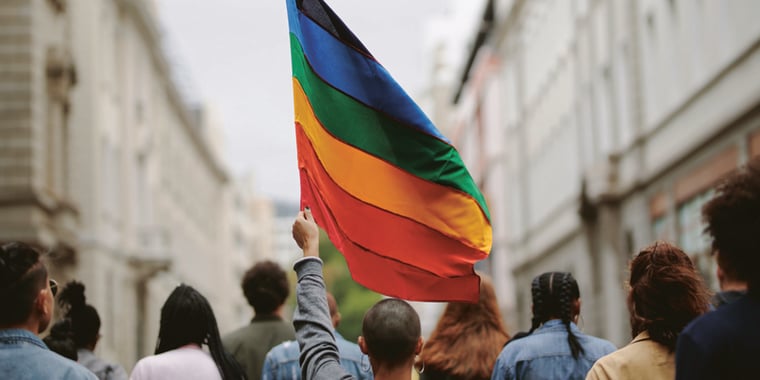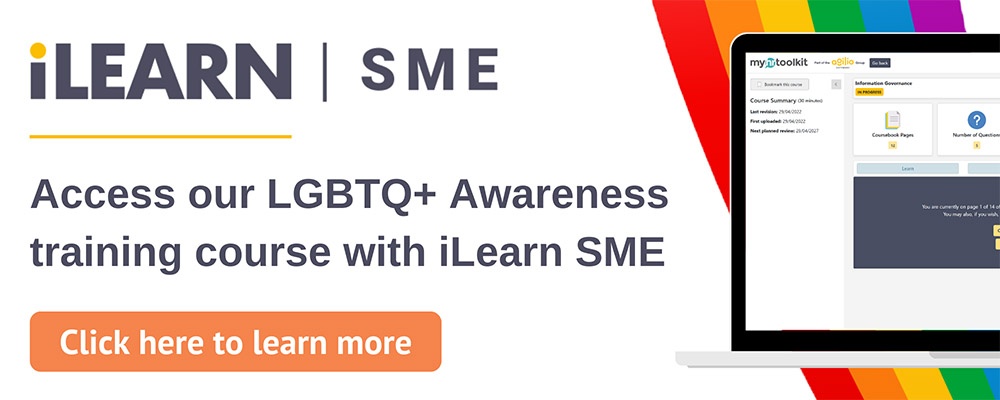Does your business need LGBTQ+ training? Employment law and HR expert Catherine Wilson outlines the benefits LGBTQ+ training can bring to the workplace and discusses what you should include in your LGBTQ+ training.
All employers have increasingly diverse workforces which reflect wider society. The need for diversity or equal opportunities training has been well recognised for several decades. In this context however, due to range of legal issues relating to sex, gender or identity, specific LGBTQ+ training has become an increasingly important part of managing the workforce.
What does LGBTQ+ mean?
The abbreviation LGBTQ+ refers to persons who identify as variously lesbian, gay, bisexual transgender, and queer. The definition is also inclusive of persons whose sexual orientation and gender identities are not heterosexual or cisgender (cisgender being a person whose sense of personal identity and gender corresponds with their birth sex). LGBTQ+ people are included within the wider nine legally protected characteristics contained within the 2010 Equality Act (age, disability, gender reassignment, marriage and civil partnership, pregnancy and maternity, race, religion or belief, sex, and sexual orientation).
The importance of diversity within the workplace, including LGBTQ+ issues, is well established within the workplace. As a result, although not a strict legal requirement (i.e., there is no direct penalty for not having a policy) all employers are likely to have an equality and diversity policy, normally in their physical or virtual staff handbook. A policy by itself is however of very limited efficacy if it is not reinforced by training.

What are the benefits of LGBTQ+ training?
There are various benefits, some being easier to measure than others and including both financial and more subtle, implied factors. They include:
- Employees feeling more engaged in diverse inclusive workplaces, which makes them more productive;
- Employers obtaining a competitive advantage, enabling them to outperform competitors and attract diverse customers;
- A diverse, inclusive workplace can assist with the current recruitment challenge. It can improve its retention of diverse staff as well as making itself more attractive to external new recruits; and finally:
- Employers must be able to show they have diversity training, including LGBTQ+ training, if they wish to rely on the Statutory Defence in Employment Tribunal Proceedings relating to discrimination in relation to any of the protected characteristics highlighted above.
So, what is the Statutory Defence?
The starting point is the liability of employers for the discriminatory conduct of their employees. Section 109 (1) of the Equality Act 2010 provides that an employer is liable for conduct performed by an employee of the business in the course of their employment. At the same time, there is a recognition that an employer may have genuinely done what they could to try and prevent discriminatory acts. In such circumstances, employers can seek to rely upon section 109 (4) of the Equality Act 2010, which is known as the Statutory Defence. If an employer took all reasonable steps to prevent the discriminatory conduct, then they will not be liable for the offending behaviour. In context, reasonable steps are likely to include appropriate policies but must ensure staff are aware of those policies and receive relevant training.
Some additional guidance as to what training is sufficient for these purposes is found in Allay Limited v Mr S Gehlen 2021. The Gehlen case concerned race discrimination, however, it is equally relevant in the context of LGBTQ+ training. Allay Limited choose to rely upon the statutory defence. Amongst other things, Allay Limited cited equality and diversity training given to staff two years earlier. Their defence was rejected by the Employment Appeal Tribunal. The Employment Appeal Tribunal described the status of the training as being stale and in need of urgent refreshment. The learning points for employers are to ensure that any training content is up to date. Training needs to be mandatory and repeated on a regular basis, and at key stages in the employment journey, such as induction and role change. An employee undertaking supervisory and or management duties should be a particular focus. Reference to LGBTQ+ training should also form part of the individual appraisal, performance management process, and referenced in appraisal goals and objectives.

What should LGBTQ+ training include?
It will be clear that there will be a variety of approaches to LGBTQ+ training. As a minimum, the training should explain the legal basis of discrimination law and LGBTQ+, as well as employer and employee liabilities. The training should go further and ensure an understanding of the wider meaning of LGBTQ+ inclusion and how organisations can create safe and more inclusive workplaces.
The importance of up to date policies and guidelines has already been highlighted; however, these must be at the centre of any training programme. Awareness is a good starting point, but this should be a continuous process, not a one off, single event. The training should provide an opportunity to review policies and discuss potential changes, as well as training on gender sensitivities, the promotion of appropriate use of language in the workplace, and appropriate behaviour within the workplace celebrating cultural and sexual difference.
Read more from the myhrtoolkit blog

Written by Catherine Wilson
Catherine is an expert employment lawyer and HR problem solver. She works as an Employment Partner at W Legal Limited and also runs her own employment law and HR consultancy, training, and writing business, McBrownie Ltd.


 Holiday Planner
Holiday Planner Absence Management
Absence Management Performance Management
Performance Management Staff Management
Staff Management Document Management
Document Management Reporting
Reporting Health and Safety Management
Health and Safety Management Task Management
Task Management Security Centre
Security Centre Self Service
Self Service Mobile
Mobile




